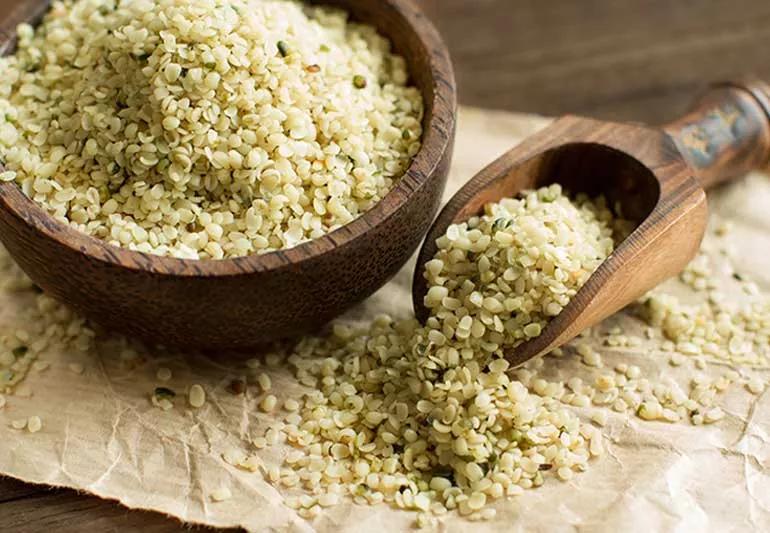Try this slightly sweet seed for hunger-fighting protein and disease-fighting fatty acids

Image content: This image is available to view online.
View image online (https://assets.clevelandclinic.org/transform/b13735f3-a704-4c32-8d75-a450d93ae3bb/Hemp-Seeds-507146608-770x533-1_jpg)
bowl and scoop of uncooked hemp seeds
If you’ve been bypassing hemp seeds in the grocery store because you associate hemp with cannabis (marijuana) — or maybe you’re just not a seed lover — it’s time to give these tiny, tasty powerhouses another look.
Advertisement
Cleveland Clinic is a non-profit academic medical center. Advertising on our site helps support our mission. We do not endorse non-Cleveland Clinic products or services. Policy
Hemp seeds are one of the six best seeds you can eat. “The Cannabis sativa plant that we get hemp seeds from is a different variety than the one that produces marijuana,” says registered dietitian Julia Zumpano, RD, LD. You won’t get high from hemp seeds because it has such a small amount of tetrahydrocannabinol (THC) — the compound in marijuana that gives you that buzz.
“Hemp seeds are a crunchy seed with a slightly sweet, mildly nutty flavor,” she adds. Despite their name, hemp seeds are actually nuts. (But not tree nuts, so they’re safe for people with peanut allergies or other food allergies.)
While shopping, you may also see packages of hemp hearts. The “hearts” are the inside part of the seed. “Some people prefer the taste or softer texture of shelled hemp seeds,” notes Zumpano. With or without the shells, hemp seeds pack a nutritional punch.
One serving (3 tablespoons or 30 grams) of whole hemp seeds has approximately:
Nutrient-wise, a serving of hemp seeds is a good source of:
Advertisement
There isn’t a lot of research on the health benefits of hemp seeds because it was illegal to grow hemp (or any cannabis plant) in the United States until 2018. Still, we know hemp seeds are chock-full of protein, fiber and good-for-you nutrients. “In many ways, hemp seeds are a superfood,” says Zumpano.
Health benefits of hemp seeds include:
A serving of hemp seeds has almost 10 grams of protein — that’s more than an egg! Plus, hemp seeds are a complete protein, with all nine essential amino acids. “Your body needs essential amino acids for a healthy metabolism, immune system and brain function,” says Zumpano. “You can only get essential amino acids through foods.”
Because it takes longer for your body to break down protein (and this extra effort burns more calories), protein can help you shed pounds. Protein is also important for building muscle. “Hemp seeds are a healthy, high-protein snack for people eating a vegetarian diet or cutting back on animal protein,” she adds.
High amounts of antioxidants and omega-3 fatty acids in hemp seeds may help to:
Hempseed oil and hempseed oil supplements contain both omega-3 and omega-6 fatty acids. One study suggests that these fatty acids may relieve eczema-induced itchy skin.
Another study (that didn’t specifically look at hempseed oil) found that omega-3 and omega-6 supplements may prevent hair loss in women while also making hair strands thicker.
A serving of unshelled hemp seeds has 1 gram of soluble and insoluble fiber. That might not sound like much. But Zumpano says most Americans don’t get enough fiber in their diets, so any amount helps. A high-fiber diet can fill you up to promote weight loss, bulk up stools to prevent constipation and lower cholesterol. The linolenic acid in hemp seeds has also been shown to help lower cholesterol.
Most of the fiber is in the seed’s crunchy outer shell. But if you prefer the softer inner hemp hearts, you can still get fiber by using ground whole hempseed products like hemp flour and hemp protein powder.
Hemp seeds are a rich source of gamma-linolenic acid (GLA). This omega-6 fatty acid may reduce the effects of prolactin, a hormone that contributes to breast tenderness and other premenstrual syndrome (PMS) symptoms. Experts think that GLA in hemp seeds may also ease menopause symptoms. Research has also found that it has anti-inflammatory effects.
Advertisement
Adding a lot of hemp seeds (especially with their fibrous shells intact) to your diet all at once can lead to stomach upset, gas and diarrhea. A serving is 3 tablespoons, but consider starting off with 1 tablespoon per day and gradually adding more.
And if you take medications, talk to your healthcare provider before adding hemp seeds to your diet. Hemp seeds may interact with certain medications, like:
Hemp is an extremely useful plant. Manufacturers use the fiber in the plant stems to make biodegradable plastics, cosmetics, paper and fabrics.
To add hemp seeds to your diet, you can:
Despite its cannabis connection, eating hemp seeds is more likely to curb your munchies — not bring them on. Plus, you benefit from healthy protein, fiber and nutrients!
Advertisement

Sign up for our Health Essentials emails for expert guidance on nutrition, fitness, sleep, skin care and more.
Learn more about our editorial process.
Advertisement
Pick bell peppers to help fight cancer, memory decline and joint pain
The tropical fruit is a good source of antioxidants and vitamin C
High amounts of cholesterol and saturated fat in red meat may be linked to heart disease
The leaves and pods from this tree are rich in essential nutrients
This starchy root vegetable is a staple in many global cuisines — but it has to be prepared correctly, or it can cause serious concerns
These delicate green sprouts can give you an extra dose of vitamin K and other nutrients — but they’re not safe for everyone
Edamame, lentils and chicken breast are good sources of protein
Eating this root vegetable can help support your eye, heart and brain health
Prioritize your health by managing stress, strengthening your social connections and getting quality sleep
Bolsters, blankets, pillows and blocks can offer extra support, stability and comfort
Allergies, postnasal drip, asthma or reflux could be to blame for a cough that won’t quit